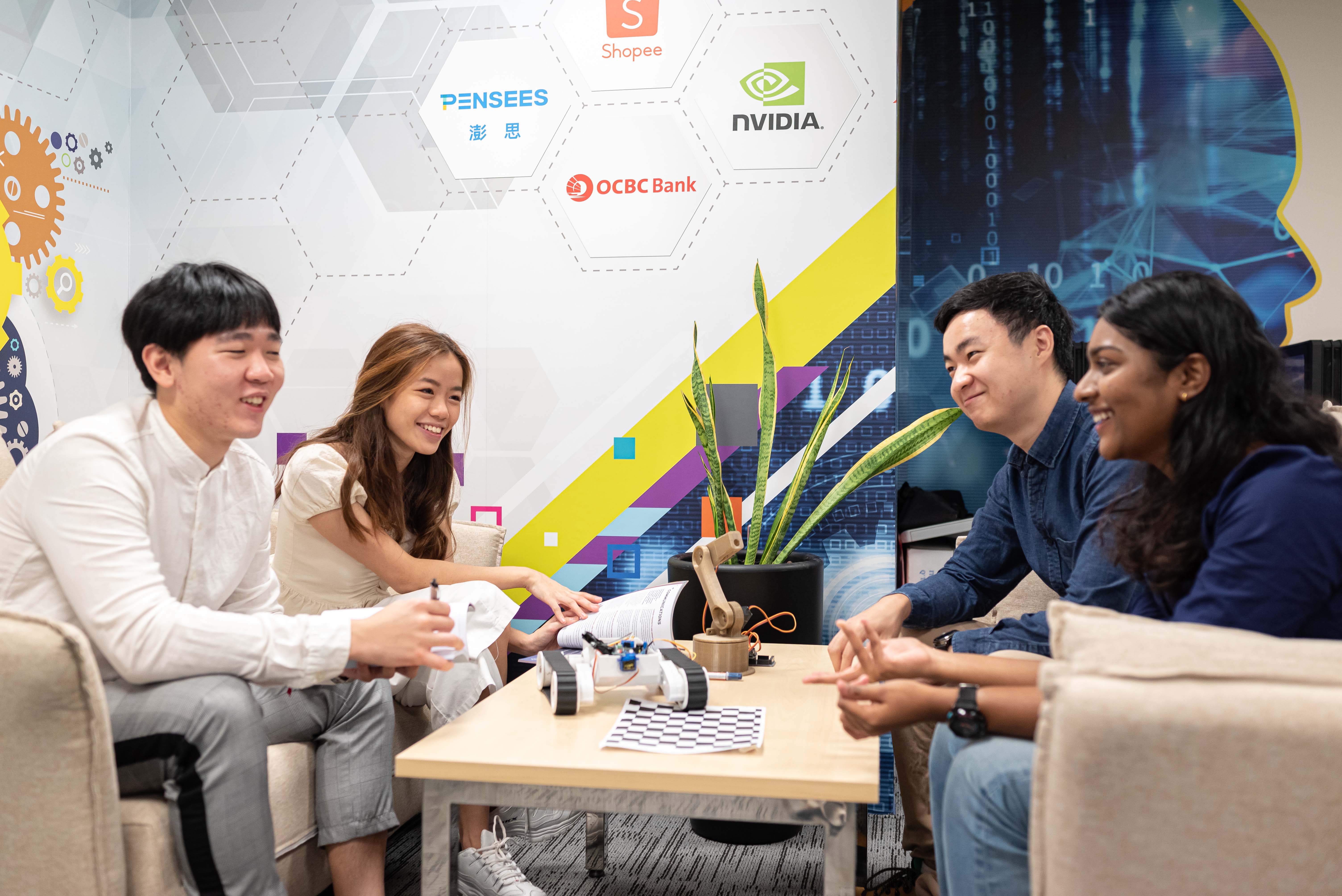The Bachelor of Engineering in Information Engineering and Media (IEM) is a four-year direct-honours programme hosted by the School of Electrical and Electronic Engineering, and jointly offered with the School of Art, Design and Media, School of Computer Science and Engineering, and Wee Kim Wee School of Communication and Information.
A NEW BREED OF ENGINEERS
Technology is witnessing a new revolution. By merging art and creativity with information, communications and digital media technology, new breakthroughs have been achieved. Remarkable progress in movie and games, for instance, can only be made possible with technology working hand in hand with art and creativity. This new revolution has opened up new possibilities, experiences and business opportunities that will radically change the world. It has created the need for a new breed of infocomm engineers equipped with sound understanding of the artistic and creative processes in media design and production. The Bachelor of Engineering in Information Engineering and Media (IEM) is here to answer this need. This four-year direct-honours programme is hosted by the School of Electrical and Electronic Engineering, and jointly offered with the School of Art, Design and Media, School of Computer Science and Engineering, and Wee Kim Wee School of Communication and Information. Leveraging on the strengths and expertise of four NTU schools, this multidisciplinary and cross-disciplinary degree programme aims: To train professional Infocomm engineers with strong technical skills to meet the demand for Infocomm manpower. To train engineers with an exposure to the artistic and creative processes and equip them with an understanding of the needs of the growing media industry. To provide graduates with a strong foundation in mathematics, information sciences and soft-skills for diverse careers and life-long learning. To develop graduates with a good understanding of their roles in society and a strong sense of ethical and professional responsibilities.
AT THE CUTTING-EDGE OF TECHNOLOGY & ART
The programme is mainly technical. Sixty percent of the curriculum is devoted to technical courses in Information and Communications Engineering, such as programming, computer hardware/software, communications and networking, and digital audio/image/video processing. This strong emphasis on technical foundation produces infocomm professionals equipped to work in the IT, computer and communications industries. The programme also exposes students to the artistic and creative aspects of the media industry. About 20% of the curriculum is devoted to courses such as digital art and design, animation and game design, and radio/TV/movie production. This part of the curriculum allows students to graduate with a sound knowledge of media design and production in line with industrial needs. The graduates will be able to work with media designers in content creation, production and delivery. They will be in a unique position to better understand the needs of the content creators and to develop new technologies and tools which will help the Media industry achieve higher productivity and elevate it to the next level of excellence. Besides the specialised training, students are ensured a holistic and rich learning experience, as 20% of the curriculum is devoted to broadening courses in arts, humanities and social sciences, science and technology, and business and communication skills. These arm students with the capacity to readily adapt to the demands of tomorrow.
Singapore-Cambridge GCE “A” Level
Pass in H2 Level Mathematics, and
Pass in H2 Level Physics/Chemistry/Biology/Computing, and
Polytechnic Diploma
Polytechnic Diploma holders or Final Year students with relevant diplomas from a local polytechnic in Singapore will be considered for direct entry into the second year.
The list of acceptable diplomas is available at here.
International Baccalaureate Diploma
Pass in Higher Level Mathematics, and
Pass in Higher Level Biology/Chemistry/Computer Science/Physics, and
Pass in Standard Level Physics 2 or equivalent
NUS High School Diploma
Major CAP of 2.0 in Mathematics, and
Major CAP of 2.0 in Biology/Chemistry/Physics, and
Overall CAP of 2.0 in Physics 3 or equivalent
International and Other Qualifications
Pass in Senior High School Level Mathematics, and
Pass in Senior High School Level Biology/Chemistry/Physics, and
Pass in Junior High School Level Physics 4
NOTE
1 Pass in H1/'O' Level Physics is only applicable to applicants who have not read H2 Level Physics.
2 Pass in Standard Level Physics is only applicable to applicants who have not read Higher Level Physics.
3 Overall CAP of 2.0 in Physics is only applicable to applicants who have not majored in Physics.
4 Pass in Junior High School Level Physics is only applicable to applicants who have not read Senior High School Level Physics.
For more information, do refer here
Students with outstanding Singapore GCE ‘A’ Level, International Baccalaureate (IB), and NUS High School Diploma results may be eligible for exemptions from up to 3 selected first-year courses.
Polytechnic Qualifications
Course exemption for top local polytechnic students may be reviewed on a case-by-case basis, depending on the diploma and courses that students have taken in their respective polytechnic, and if they satisfy the requirements/conditions set by their respective engineering schools. Generally, students with an Advanced Certificate, Diploma Plus certificate and/or Certificate of Merit or Distinction may be considered for exemption from up to 4 courses or 12 AU, depending on the relevance of the polytechnic courses taken and the grades obtained.
Click here for more information.
Full Time
4 years
A NEW BREED OF ENGINEERS
Technology is witnessing a new revolution. By merging art and creativity with information, communications and digital media technology, new breakthroughs have been achieved. Remarkable progress in movie and games, for instance, can only be made possible with technology working hand in hand with art and creativity.
This new revolution has opened up new possibilities, experiences and business opportunities that will radically change the world. It has created the need for a new breed of infocomm engineers equipped with sound understanding of the artistic and creative processes in media design and production.
The Bachelor of Engineering in Information Engineering and Media (IEM) is here to answer this need.
This four-year direct-honours programme is hosted by the School of Electrical and Electronic Engineering, and jointly offered with the School of Art, Design and Media, School of Computer Science and Engineering, and Wee Kim Wee School of Communication and Information.
Leveraging on the strengths and expertise of four NTU schools, this multidisciplinary and cross-disciplinary degree programme aims:
To train professional Infocomm engineers with strong technical skills to meet the demand for Infocomm manpower.
To train engineers with an exposure to the artistic and creative processes and equip them with an understanding of the needs of the growing media industry.
To provide graduates with a strong foundation in mathematics, information sciences and soft-skills for diverse careers and life-long learning.
To develop graduates with a good understanding of their roles in society and a strong sense of ethical and professional responsibilities.
AT THE CUTTING-EDGE OF TECHNOLOGY & ART
The programme is mainly technical. Sixty percent of the curriculum is devoted to technical courses in Information and Communications Engineering, such as programming, computer hardware/software, communications and networking, and digital audio/image/video processing. This strong emphasis on technical foundation produces infocomm professionals equipped to work in the IT, computer and communications industries.
The programme also exposes students to the artistic and creative aspects of the media industry. About 20% of the curriculum is devoted to courses such as digital art and design, animation and game design, and radio/TV/movie production. This part of the curriculum allows students to graduate with a sound knowledge of media design and production in line with industrial needs. The graduates will be able to work with media designers in content creation, production and delivery. They will be in a unique position to better understand the needs of the content creators and to develop new technologies and tools which will help the Media industry achieve higher productivity and elevate it to the next level of excellence.
Besides the specialised training, students are ensured a holistic and rich learning experience, as 20% of the curriculum is devoted to broadening courses in arts, humanities and social sciences, science and technology, and business and communication skills. These arm students with the capacity to readily adapt to the demands of tomorrow.
Click here for more information.
An IEM graduate is able to secure career in varied fields, includes:
Advertising Service & Market Research
Banking & Finance
Business & Management
Computer Engineering
Education
Electronic Products
Gaming, Amination & Interactive Entertainment
Healthcare
Information & Communication
Information Technology
Internet Services
Media
Public Administration & Defence
Research & Development
Telecommunication
The School’s Bachelor of Engineering programmes are accredited by the Institution of Engineers Singapore (IES) through its Engineering Accreditation Board. IES is the Singapore signatory of the Washington Accord - an international agreement for mutual recognition of the substantial equivalence of engineering academic programmes, in satisfying the requirements for practicing engineering at the professional level.
Our curricula provide an excellent foundation for either graduate study or employment. Education and research activities are strongly aligned with our mission and Programme Educational Objectives (PEOs). PEOs are broad statements that describe the career and professional accomplishments that the programme is preparing graduates to achieve.
Our PEOs are aligned closely with EAB’s Student Learning Outcomes (SLOs). They are narrower statements that describe what students are expected to know and be able to do when they graduate.
Each programme also must satisfy a set of criteria specific to it, known as Specific Programme Criteria (SPC). The stipulations in the SPC chiefly concern curricular issues and qualifications of faculty.



71c552b9-56d0-4df7-a4b1-8ea31da180b9.png?sfvrsn=71e9d4da_3)


